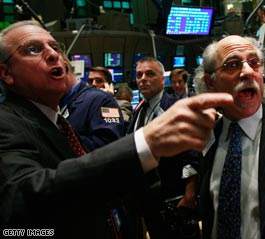
Stocks rally on Treasury secretary talk
NEW YORK (CNNMoney.com) -- Stocks rallied Friday, with the Dow industrials bouncing as much as 550 points, after reports surfaced that President-elect Barack Obama will nominate New York Federal Bank president Timothy Geithner as his new Treasury Secretary.
The Dow Jones industrial average (INDU) rose 494 points, or 6.6%, according to early tallies. It was the fifth-biggest single-session point gain ever, according to Dow Jones.
The Standard & Poor's 500 (SPX) index gained 6.3% and the Nasdaq composite (COMP) added 5.2%.
Stocks rallied in the morning on reports that troubled Citigroup (C, Fortune 500) might put itself up for sale. But the company's CEO shot down the rumors in a call with senior managers, sending Citi's shares and the broader market lower.
But the market managed to snap back in the last two hours of trading as reports about the president-elect's cabinet appointment circulated. Stocks had also been primed for a snap-back rally anyway, after the S&P 500 ended the previous session at an 11-1/2 year low.
In particular, Wall Street seemed to welcome Obama's reported pick of Geithner, the vice chairman of the Federal Reserve's policy-setting committee. Geithner was the Fed's point person on the rescue of Bear Stearns and AIG.
Additionally, New Mexico Gov. Bill Richardson is reportedly being considered for Commerce Secretary.
The Dow has lost 10.4% over the last two sessions, its worst two-day percentage drop in over 20 years, according to Dow Jones.
Looking forward, stocks aren't likely to see a lasting rally in the weeks ahead, with the markets continuing to be driven by the day-to-day news, said Ron Kiddoo, chief investment officer at Cozad Asset Management.
"Maybe if we start to hear that Christmas isn't going to be quite as terrible as everyone thinks or if we get some other shred of less negative news, we can see a small advance," he said. "But at this point, I just don't see the catalyst."
Banks and homebuilders: Companies hit most directly by the subprime mortgage fallout and credit crisis were under pressure.
The bank sector and the credit market had seen some improvement in late October and early November amid a series of steps by the government to make cash more available. But now that trend seems to have ended. That's especially been the case since the Treasury Department said it will no longer buy banks' bad mortgage debt, as it originally planned to do, through the $700 billion bailout.
Citigroup's plunge of 22% on questions about its future exacerbated the gloom hanging over the sector.
Among the other bank movers, JPMorgan Chase (JPM, Fortune 500) shares slumped 15%, Bank of America (BAC, Fortune 500) lost 9% and Merrill Lynch (MER, Fortune 500) lost 7%.
Auto sector: Investors also contended with the albatross of the automakers, with an auto sector bailout all but dead. The top executives of the Big Three automakers told Congress this week that need a $25 billion loan to stay in business.
Some critics think the companies would be better served by declaring bankruptcy and restructuring. However, such a move would still bring job losses and more strain on the already struggling economy.
Congress has pledged to return next month to reconsider the bid if the automakers can come up with a "viable" recovery plan. GM (GM, Fortune 500) and Ford (F, Fortune 500) shares dropped Friday.
Other company news: After the close Thursday, Dell (DELL, Fortune 500) reported weaker earnings that topped estimates and weaker revenue that missed estimates. But the stock fell anyway.
Gap (GPS, Fortune 500) was one of the session's bright spots. After the close Thursday, the apparel retailer reported higher earnings that topped analysts' estimates on weaker revenue that missed estimates. Shares gained 16% Friday.
Other markets: Global markets were mixed, with Asian stocks ending higher and European markets ending lower.
U.S. light crude oil for January delivery rose 51 cents to settle at $49.93 a barrel on the New York Mercantile Exchange, in the first day of trading for the new contract.
The dollar fell versus the euro and gained against the yen.
COMEX gold for December delivery rallied $43.10 to settle at $791.80 an ounce.
For the first time in 3-1/2 years, gasoline prices fell below $2 a gallon, losing 3.1 cents to a national average of $1.989 a gallon, according to a survey of credit-card activity released Friday by AAA. Prices have been dropping for over two months. In that time, prices have lost $1.84 a gallon, or over 52%.
Bonds: Treasury yields bounced back Friday after the 2-year, 10-year and 30-year government bonds all finished the previous session at the lowest levels since the Federal Reserve started keeping records in 1962.
The yield on the 3-month Treasury bill hung close to 68-year lows of zero, versus a yield of 0.01% Thursday. The 3-month - seen as the safest place to put money in the short term - last hit these levels in September as investor panic peaked. The low yield means nervous investors would rather preserve their money despite no interest rather than risk the stock market.
Borrowing rates worsened a bit. The 3-month Libor rate rose to 2.16% from 2.15% Thursday, while overnight Libor rose to 0.47% from 0.44% Thursday, according to Bloomberg.com. Libor is a key bank lending rate. ![]()
'Business' 카테고리의 다른 글
| Sources: Richardson a 'serious contender' for Commerce job (0) | 2008.11.22 |
|---|---|
| Obama expected to tap Geithner for Treasury (0) | 2008.11.22 |
| Street's Rally Can't Lift Citigroup (0) | 2008.11.22 |
| How Your Data Can Get Loose (0) | 2008.11.22 |
| Meta Data: iPhone 2.2 (0) | 2008.11.22 |


